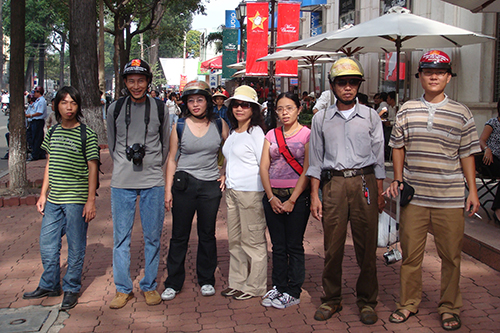As an independent blogger, Ta Phong Tan often highlighted abuses in Vietnam’s justice system. Now as a prisoner of conscience serving a 10-year sentence for “propagandizing against the state,” an anti-state offense under Article 88 of Vietnam’s criminal code, she is suffering under the same abusive system she once critiqued and exposed.
Earlier this year Tan staged a hunger strike for about three weeks to protest poor prison conditions. It was believed to be the third time she has fasted in protest since first being detained in September 2011. Tan is being held in solitary confinement in a stifling, windowless cell, according to her sister, Ta Minh Tu.
In email correspondence with CPJ, Tu spoke about her sister’s dire situation and renewed her family’s call for Tan’s immediate and unconditional release. Her responses have been translated from Vietnamese.
CPJ: Some families of prisoners in Vietnam tell us they seldom get to see their loved ones who are behind bars. When was the last time you were able to see your sister?
Ta Minh Tu: Since my sister Tan was imprisoned, prison officers have regularly caused difficulties each time we try to visit her. Each visit, we have to wait from 90 minutes up to two hours before seeing Tan. The last visit I made was on June 14, 2015 to persuade her to stop her hunger strike. When I met Tan, she said she stopped her hunger strike on June 3, 2015.
CPJ: There is great concern about her health, especially after her last hunger strike. How is she faring now?
Ta Minh Tu: She has four different problems: Chronic inflammation of the throat, rheumatism, high blood pressure, and a coronary heart problem. I am extremely concerned that she could get sick and even die at any time if the prison officers continue to use revolting methods to harm her.
CPJ: It seems that she is taking a line of resistance similar to blogger and CPJ International Press Freedom Award winner Nguyen Van Hai while he was in jail. Is it correct that she is not seeking release on any grounds other than that the government drop its anti-state charges against her and that she be freed unconditionally?
Ta Minh Tu: Yes, Tan has chosen to confront the injustices in prison, the intentional violations of the regulations by the prison officers, the maltreatment of political prisoners, the terrorism of the mind, and all kinds of unimaginable torture. One of the methods: prison officers order Tan to write a monthly “confessional statement” in order to receive clemency. Tan always answers that she is innocent and only speaks the truth.
Therefore she will not write any confession, nor make any kind of statement that complies with the government’s demands in exchange for her freedom. My sister only demands the communist regime releases her without any condition, as she is innocent.
CPJ: Nguyen Van Hai tells me he didn’t want to leave Vietnam, but was simply taken from prison and put on a plane and sent to California. Could that happen with your sister? Even if she doesn’t want to leave Vietnam?
Ta Minh Tu: I think Tan could face the same situation as Nguyen Van Hai. To leave the country or not, it should depend on Tan’s decision.
CPJ: Do you think appealing to the Vietnamese authorities to grant a temporary release to Tan so that she may receive proper medical treatment is realistic?
Ta Minh Tu: I believe we have to call on the Vietnamese government to release Tan so she has the time and opportunity to receive much-needed health treatment. I honestly hope this happens.
CPJ: From outside Vietnam it looks like the government is becoming more repressive, especially when it comes to silencing the blogging community. Do you see any hope that the authorities might reverse their policies?
Ta Minh Tu: The Vietnamese government has greatly increased its oppression, especially in shutting down voices in the blogger community. In my opinion, the communist regime does not want to change its policies and is determined to keep its dictatorship system.
If it wanted to change it would have removed those laws–including decrees 79, 88, and 258–that allow the regime to freely arrest citizens and violate human rights, especially freedom of speech.
CPJ: Hanoi and Washington are quickly drawing closer together economically and militarily. The American government tells its critics that tactic is the best way to influence the Vietnamese government’s repressive attitude toward media freedom and broader human rights issues. Do you and your sister think U.S. policy toward Vietnam is helping to improve the situation, or making it worse?
Ta Minh Tu: Various human rights organizations and the United States government have criticized the Vietnamese government for its poor rights record. But so far whether or not the government listens to them is entirely dependent on itself. Whether the government complies with what it has committed to with the United Nations, including the Convention Against Torture, is totally its own choice.
Would the U.S. government’s policies toward Vietnam help improve human rights conditions? On this, I believe and hope that the United States would know how to handle any situation. And I trust that the United States would never allow barbarism to reign. Therefore, I support the U.S. and I think so does my sister Tan.
CPJ: What can people do, inside and outside of Vietnam, to help your sister?
Ta Minh Tu: I hope all Vietnamese inside the country and around the world embrace the spirit of “we are one” in fighting for the freedom of political prisoners in Vietnam, in calling on the international community to pressure the Vietnamese government to respect human rights and release all prisoners of conscience, including my sister, Ta Phong Tan. I sincerely thank you.
